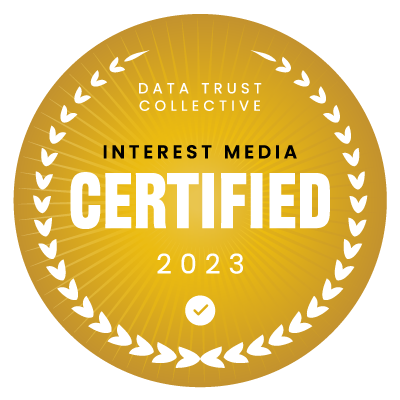
Leverage AI for Predictive and Consumer-Centric Marketing
- Leverage the power of AI for predictive marketing for more accurate customer segmentation, strategic ad placement, optimizing your campaigns, and more.
- Use AI to deliver a consumer-centric marketing strategy that creates personalized interactions, and seamless journeys that deliver positive customer experiences. Work with Interest Media to fast-track your campaigns.
- Discover the parts of AI-written content that people prefer so your human-written copy or AI collaborations will please audiences without triggering gatekeeper flags.
Leverage the Power of AI for Predictive Marketing
“53% of marketing leaders use or plan to use AI for predictive analytics and customer insights,” – Forrester
Predictive marketing with AI involves leveraging advanced algorithms and machine learning techniques to analyze large volumes of data. and predict future customer behaviors, preferences, and trends.
By mining historical data and identifying patterns, predictive AI models can anticipate outcomes such as customer purchases, churn rates, and campaign performance. This enables marketers to make data-driven decisions, personalize customer experiences, and optimize marketing strategies for better results.
Predictive marketing with AI can also empower businesses to anticipate market shifts, identify high-value leads, and optimize resource allocation. This ultimately drives improved ROI and competitive advantage in today’s data-driven marketing landscape.
Why should marketers use predictive AI as part of their marketing strategy?
“41% of businesses use AI to create personalized consumer experiences,” – Influencer Marketing Hub
Marketers should incorporate predictive AI into their marketing strategy for several compelling reasons:
1. Personalized Customer Experiences
Predictive AI analyzes vast amounts of customer data to anticipate behaviors, preferences, and needs. By leveraging this technology, marketers can deliver highly personalized experiences tailored to individual customers, increasing engagement and loyalty.
2. Enhanced Targeting and Segmentation
Predictive AI enables marketers to segment their audience more effectively based on predictive insights. This ensures that marketing efforts are targeted toward the right audience segments with messages and offers that resonate, leading to higher conversion rates and ROI.
3. Optimized Marketing Campaigns
Predictive AI can forecast the outcomes of marketing campaigns by analyzing historical data and identifying patterns. Marketers can use these insights to optimize various aspects of their campaigns, such as messaging, timing, and channel selection, to maximize effectiveness and drive better results.
4. Improved Lead Scoring and Conversion
By analyzing past interactions and behaviors, predictive AI can identify high-quality leads with a higher propensity to convert. This enables marketers to prioritize their efforts on leads most likely to result in conversions, thereby improving lead generation and sales efficiency.
5. Anticipating Market Trends
Predictive AI can analyze market trends and consumer behaviors to forecast future demand and identify emerging opportunities. By staying ahead of market trends, marketers can proactively adjust their strategies and offerings to capitalize on new opportunities and gain a competitive edge.
6. Streamlined Decision-Making
Predictive AI provides marketers with data-driven insights that help streamline decision-making processes. By removing guesswork and relying on predictive models, marketers can make more informed decisions about resource allocation, budgeting, and strategy development.
7. Continuous Learning and Optimization
Predictive AI systems continuously learn and adapt based on new data inputs and feedback. This iterative process enables marketers to refine their strategies over time, ensuring that their marketing efforts remain effective and relevant in an ever-changing landscape.
Summary
Predictive AI empowers marketers to harness the power of data-driven insights to create more personalized, targeted, and effective marketing strategies. By leveraging predictive AI, marketers can drive better business outcomes, enhance customer experiences, and stay ahead of the competition in today’s increasingly digital and data-driven marketplace.
Use AI To Deliver a Consumer-Centric Marketing Strategy
“52% of customers would switch to act company’s competitor after one bad experience,” – Zendesk
Consumer-centric marketing is a strategic approach that prioritizes the needs, preferences, and experiences of the customer above all else. In other words, it’s a customer-first approach.

How consumer-centric marketing works
At its core, consumer-centric marketing focuses on building strong relationships with customers by understanding their behaviors, motivations, and pain points.
Rather than pushing products or services onto consumers, a consumer-centric marketing approach seeks to engage and delight them by delivering personalized and relevant experiences at every touchpoint of their journey.
Consumer-centric marketing involves actively listening to customer feedback, and gathering data to gain insights into their preferences. Therefore, there is a strong need to obtain first-party data. This information is used to tailor marketing messages, offers, and interactions to meet the customer’s needs. The more your marketing can be personalized – the better.
By putting the customer at the center of marketing efforts, businesses can foster loyalty, drive engagement, and ultimately achieve sustainable growth in today’s competitive marketplace.
Making AI a part of your consumer-centric marketing strategy
“55% of marketers use AI for audience segmentation and targeting,” – Statista
Here are some of the ways AI can assist with developing and improving your consumer-centric marketing strategy:
1. Use AI to optimize customer journeys
AI can help with creating a seamless journey for your customer across all channels and touchpoints. Here are a few of the ways AI can assist:
- Segmenting your audience.
- Predicting user behavior.
- Personalizing interactions.
- Optimizing a website navigation.
- Assisting with contact center interactions.
- Tracking purchases and shopping carts.
- Maintaining a consistent tone in your messaging.
2. Use AI to create clear and relevant communications
AI can assist with your messaging to make sure it is clear, easy to read, and consistent. Further, AI can ensure that the messages you send are timely and relevant.
AI can analyze your customer data and understand each customer’s preferences. Then, AI can craft messages that resonate with your target audience as a whole and/or individual customers.
3. Personalizing user experiences
“Personalized experiences” is more than a buzz phrase, it’s an expectation of most audiences. AI is a necessary tool for personalization.
AI can analyze large chunks of data to help you better understand your customers. AI can identify patterns, segment your audience, and make personalized product recommendations. AI can help you with targeted campaigns.
AI can help predict the next actions your customers are likely to take based on patterns of their past behavior and what they are trying to achieve. By identifying where these customers are in the journey, AI can help you personalize their experience by recommending messaging and offers that are most likely to resonate with these individuals.
Interest Media can help fast-track your consumer-centric marketing strategy
“Interest Media extracts first-party data from over 25 million active consumers each month, allowing brands to connect with the precise customer segments they’re looking for.”
Why build your consumer-centric marketing strategy from scratch? Partner with Interest Media and fast-track your marketing now!
Interest Media is powered by an internally owned and operated network of web properties, leveraging exclusive first-party data. Interest Media puts the biggest brands in front of their ideal consumers with a unique, audience-centric, omni-channel solution.
Solutions for Advertisers
Interest Media allows you to create meaningful interactions with actively engaged audiences that have confirmed their intent and fit your precise consumer profile. These authenticated customers have been pre-qualified and are ready to engage with your brand.
Interest Media understands that the most important component of a successful advertising campaign is the positive experience of the consumer.
Solutions for Publishers
Interest Media enables publishers to create powerful and unique ways to introduce their audience to exclusive offers from the brand advertisers who are most likely to induce meaningful action from them, thus creating unparalleled revenue opportunities at an unlimited scale.
Interest Media offers a consumer-centric advertising solution that utilizes first-party data combined with real-time optimization that maintains a positive user experience while driving higher earnings.
Contact Interest Media Today!
Simply fill out the form below and one of our black belt, fuel-injected, business development superheroes will soon assist you in taking your digital marketing strategies to the next level and beyond.
How to Use AI to Create Content Your Audience Will Love without Triggering Gatekeeper Flags
“65.8% of people thought AI content was better or equal to human writing,” –Authority Hacker
A survey of 700 US consumers revealed a shocking find. The majority of them preferred content written by AI, according to a report by Semrush. In six consecutive battles, using the same topic, people preferred AI-generated content over what humans wrote.
For the humans’ part, Semrush engaged several writers. They also used multiple, detailed prompts to “massage” the AI prompts into final versions of content.
Why do people like AI content better?
By using several writers, it lessened the possibility that a single writer’s style may not be popular. And of course, AI can be instructed to take on a certain tone of voice.
So, why did people prefer AI-written content over that of human writers?
According to the conclusions drawn by Semrush, they believe people preferred AI-written content for the following reasons:
- The AI content got quickly to the point. In other words, it was concise.
- The AI content highlighted the reader’s concerns and value propositions. In other words, the writing focused on what mattered most.
- The AI content was easier to read and understand. In other words, the content likely communicated seventh or eighth-grade education level and avoided the use of “twenty-dollar words.” Human writers sometimes like to show off their vocabulary or to be hip or cute.
“These results show that AI-written content can be effective and resonate with your customers,” Semrush wrote. “If you prompt your AI tools well enough, you can create engaging and high-quality marketing copy.”
Nonetheless, Semrush cautioned people not to abandon human writers and hand off all their content creation to artificial intelligence.
Finding a balance between AI and human content
“However, our experiment does not suggest that AI is enough for content writing,” – Semrush
If you’re new to creating content with AI, it’s not enough to instruct AI to “write me an article about X” and take what you get. The best results come from a collaboration between humans and machines. After all, AI is a tool.
The better approach is to plan your content. Create an outline. This is also something AI can help you do. But you should also create an outline of your own as AI may not come up with the same items as you would.
Next, don’t try to get AI to write everything for you in one shot. It’s much better to take a small section at a time. That’s why an outline helps you break up your content into important “bullet points.”
Another approach you can take is to write out everything you want to say in a specific section. Then, handed off to AI with instructions to make your human writing more concise and easier to read.
A little back-and-forth between human effort and AI writing will usually deliver the best final results.
Other things to be aware of with AI
AI can be repetitive. Almost like humans do, AI seems to have some “pet words and phrases” it likes to repeat. Therefore, a human editor is necessary.
AI is not the expert on everything. AI is not an “all-knowing oracle” as some of the hype surrounding it may have you believe. Don’t rely solely on AI for expertise. Be sure to research other sources
AI gets facts wrong and “hallucinates.” AI gets facts wrong all the time. It is important to fact-check. Further, AI “hallucinates.” If AI doesn’t know something, it may straight out make it up. When in doubt, look it up.
Google and other “gatekeepers” may flag pure AI content. Another good reason for collaborating with AI is that the combination of human and AI-created content is less likely to get flagged by “gatekeepers.” Google and other search engines may penalize content that is heavily or completely AI-written, hurting your SEO rank.













